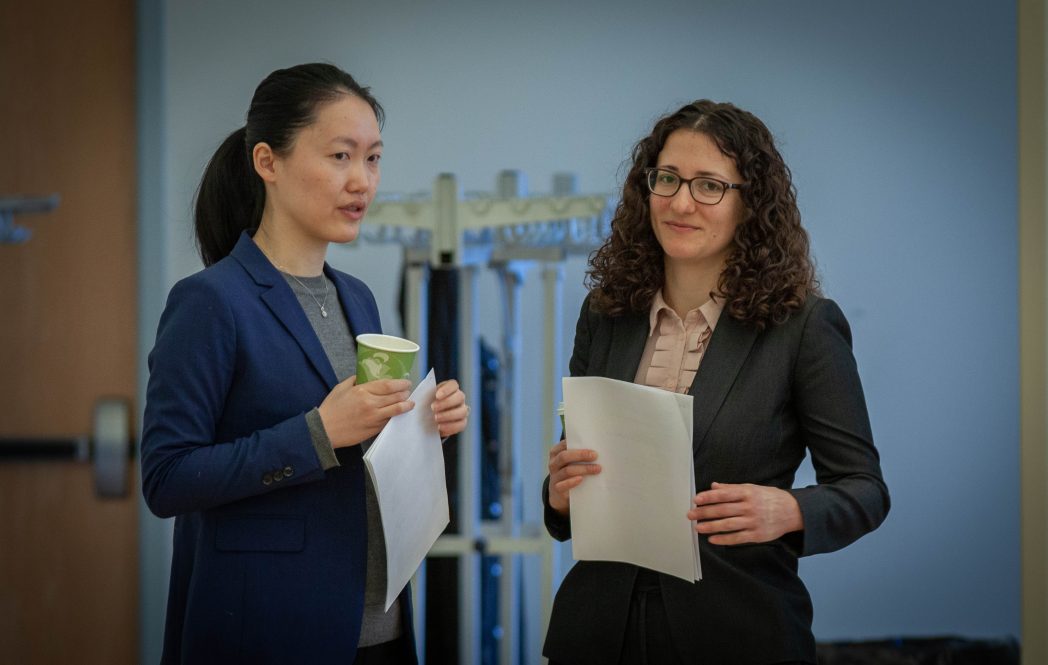The Women in STEM Frontiers in Research Expo (WiSFiRE) is one of the first conferences in the region to specifically highlight the work of women researchers in STEM. Organizers Qian Yang and Anna Tarakanova, both assistant professors in the School of Engineering, are gearing up for an event Monday that will expand on the success of the inaugural conference in 2020.
WiSFiRE 2022 will take place Monday, Sept. 12, from 8 a.m. to 5 p.m. in the Student Union Ballroom. The roster includes current UConn faculty and alumnae and will feature an address from UConn interim President Radenka Maric. The event is free and open to all UConn undergraduate and graduate students, faculty, staff, and alumni. Attendees are encouraged to register in advance to ensure seating.
“The vision here was to provide a venue for students to interact with women faculty at UConn to showcase the research that’s going on, and provide a platform where undergraduate students, graduate students and faculty could all interact with each other in this sort of scaffolded mentoring environment,” Tarakanova says.
The conference’s first iteration took place immediately before the COVID-19 pandemic shut down all in-person gatherings. Yang and Tarakanova are eager to resume and build on the first event’s success.
They’ve extended their reach across campus, inviting faculty from the College of Liberal Arts and Sciences as well as the School of Engineering. They hope to see an even higher student turnout this year than in 2020—and with this year’s record-breaking class of incoming students, they just might succeed.
WiSFiRE was born from a lunchtime conversation between Yang and Tarakanova when they were both new faculty at UConn.
“We realized that this is a sort of event that we would have wanted to see in grad school ourselves,” Tarakanova says. She points out that conferences of this type, where “research is front and center and the networking and career development components revolve around the academic track,” are rare, and rarer still are events dedicated to women researchers. She hopes that WiSFiRE will continue to be a venue for networking and mutual inspiration among women in STEM and that it will demonstrate to students that careers in research are exciting and achievable.
Yang and Tarakanova had both been involved with conference and symposia planning before, but WiSFiRE 2020 marked their first time organizing an event of this scale. They said they received abundant and enthusiastic support from the School of Engineering, their respective departments, and the broader campus community.
An unexpected perk of the last event, too, was that the faculty participants got to see just how many other women faculty work in related research areas at UConn, from a vantage point beyond individual departments and institutes. Junior and incoming faculty got a chance to extend their professional network and connect with role models who could inspire their own work and presence at UConn. This year, the faculty speakers are all getting together for a dinner following the conference — part of Yang and Tarakanova’s efforts to kindle that community.
Yang believes in the importance of events like WiSFiRE in disrupting the “self-perpetuating prophecy” that can institutionally suppress women’s success in STEM.
“The impression is often that there’s not a lot of women in academia,” she explains, “so it must be hard and difficult for women to succeed. And [students think], do I really want to go down this path? Do I belong?”
While she was a graduate student, Yang attended a data science conference that featured women researchers who inspired her to remain on the academic track.
“I remember that conference very clearly,” Yang says, “because it was structured in a way that really made you understand … it’s not an anomaly to be able to do this as a woman, and that there really is a high concentration of incredible female faculty in many different areas of engineering.”



